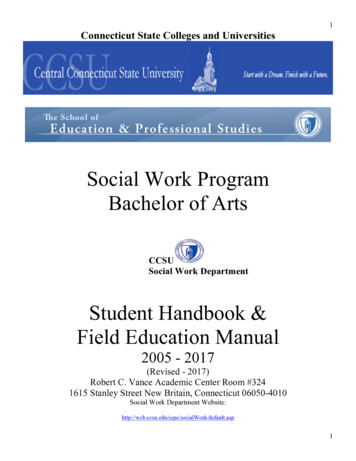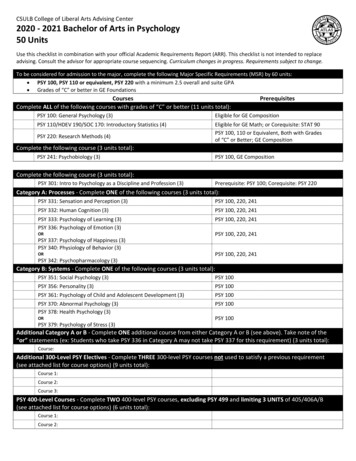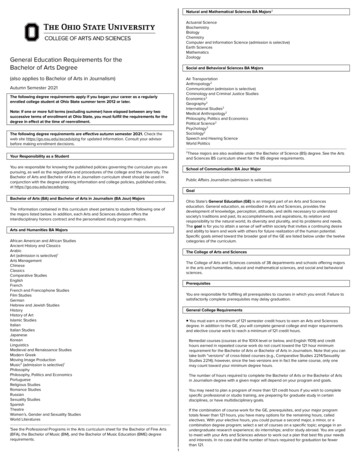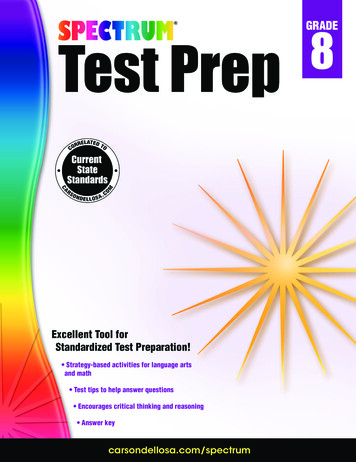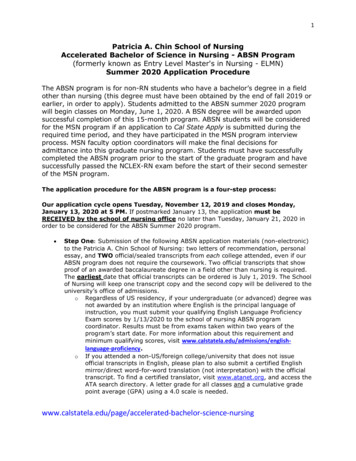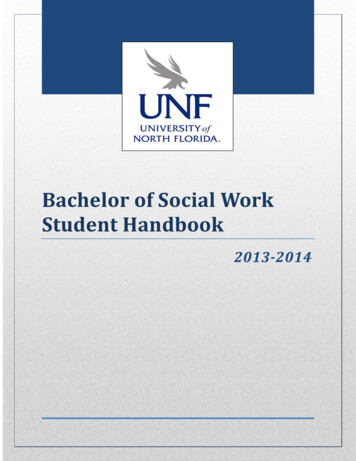
Transcription
Bachelor of Arts in Criminal Justice OnlineDegree Completion ProgramStudent Handbook & Resources
Welcome to the Criminal Justice Online program at California State University,San Bernardino! In this handbook, you will find a thorough overview of the programrequirements as well as guidance on the program’s student services, tuition & financialaid, curriculum, drop procedures, and more.Table of ContentsCollege ContactsProgram ContactsProgram RequirementsRegistration and AdvisingTuition, Fees, and Other Finance MattersFinancial Aid InformationFinancial Aid Fact SheetProgram Policies and ProceduresStudent Learning ObjectivesOther ResourcesLetter of Intent to EnrollFAQsForms & Resources2345791113141818192021
College of Social and Behavioral Sciences (SBS)Department of Criminal JusticeSocial and Behavioral Sciences, Room 2095500 University ParkwaySan Bernardino, CA 92407Phone: (909) 537-5506Fax: (909) 537-7025Website: http://criminaljustice.csusb.edu/College of Extended & Global Education (CEGE)Center for Global Innovation (CGI)Suite 3015500 University ParkwaySan Bernardino, CA 92407Phone: (909) 537-5976Fax: (909) 537-5907Program Email: cjonline@csusb.eduWebsite: http://cel.csusb.edu/cjonline3
Program ContactsJanine Kremling, Ph.D.Program DirectorProfessor of Criminal JusticeJKremlin@csusb.eduRick Flinchum, MPAProgram SpecialistContact for: Program administration, tuition & finance,student services, general program inquires & issues.Richard.Flinchum@csusb.eduLorena Segovia, MS.EdAcademic AdvisorContact for: Academic advising, course registration,academic holds (probation, etc.), graduation progression.Lorena.Segovia@csusb.eduClaudia Ochoa, MS.EdStudent AdvisorContact for: Application and recruitment advising,admissions inquiries, student retention.Claudia.Ochoa@csusb.eduVanessa Davalos, MAProgram CoordinatorContact for: Payment processing, installment plansprogram inquiries, general questions.Vanessa.Davalos@csusb.edu4
Program Requirements Students are required to complete 120 Semester Units (180 Quarter) to be eligible for graduationfrom CSUSB.The Criminal Justice Online program requires the following prior to admission: 60 semester (90 quarter) units of transferrable coursework taken at a community college orregionally accredited university.Completion of lower-division general education requirements, including CSU History, Constitutionand American Ideals requirement 1. General Education requirements are the university standarddefined in the CSUSB Bulletin.2.7 Minimum GPA (overall) required for transferCompletion of two prerequisite courses: Introduction to the Criminal Justice System (CJUS 1101)and Criminal Law (CJUS 1102).o Students are encouraged to explore Assist.org to research transferability of courses fromtheir community college. Students are also encouraged to work with theiracademic/transfer counselors to research transfer requirements at CSUSB prior tograduation at their community college.Students are required to formally apply to the CSUSB campus via CalStateApply. The applicationsystem will require students to enter their academic information for all previous institutionsattended, as well as pay the 70 application fee.Upon admission to the Criminal Justice Program, students will be required to complete:1.2.University Required Courses (15 Semester Units - up to 18 Units depending on student plan)a. Upper Division General Education (UDGE) – 9 Semester Unitsi. UDGE – Natural Sciences – SSCI 3325 (Perspectives on Gender)ii. UDGE – Arts & Humanities – PHIL 3001 (Topics in Philosophy)iii. UDGE – Social Sciences – SSCI 3316 (Race and Racism)b. Writing Intensive Courses – 2 Courses Required, 6 Semester Units Totali. University Writing #1 – SSCI 3060 (Expository Writing for the Social Sciences) –3 Unitsii. University Writing #2 – MGMT 3500 – Applied Communication – 3 Unitsc. Diversity and Inclusion Designation – 3 Semester Unitsi. As needed, students will either have this requirement fulfilled by:1. SSCI 3316 (Race and Racism) – 3 Units2. SSCI 3325 (Perspectives on Gender) – 3 Units3. CJUS 4451 (Women and Crime) – 3 Unitsd. Global Perspectives Designation – 3 Semester Unitsi. Fulfilled by:1. SSCI 3316 (Race and Racism) – 3 UnitsCriminal Justice – Core Courses (7 Courses, 21 Semester Units)a. CJUS 3311 – Research Methods in Criminal Justice – 3 Unitsb. CJUS 3312 – Statistics in Criminal Justice – 3 Unitsc. CJUS 3320 – Theories of Crime and Delinquency – 3 Unitsd. CJUS 3330 – Correctional Theory and Institutions – 3 Unitse. CJUS 3340 – Police and Police Systems – 3 Unitsf. CJUS 5598 – Integrative Studies in Criminal Justice – 3 Unitsg. SSCI 3060 – Expository Writing in the Social Sciences – 3 UnitsThe CSU History, Constitution, and American Ideals Requirement are typically fulfilled by the completion ofPSCI 2030 and HST 2010.15
3.Elective Courses (6 Courses, 18 Semester Units Required) – Up to 9 Semester Units in lowerdivision electives may be transferred inAs courses are offered, students will be able to indicate preference in the following elective options*:All courses are 3 semester units unless otherwise indicated CJUS 1106 – Introduction to Criminal InvestigationCJUS 3304 – Criminal ProcedureCJUS 3350 – Intelligence and Crime Analysis ICJUS 3354 – VictimologyCJUS 3370 – Law and the CourtsCJUS 3470 – Crime PreventionCJUS 4430 – Correctional AdministrationCJUS 4431 – Community CorrectionsCJUS 4435 – Correctional CounselingCJUS 4440 – Police AdministrationCJUS 4441 – Community PolicingCJUS 4451 – Women and CrimeCJUS 4452 – White Collar CrimeCJUS 4453 – GangsCJUS 4455 – Forensic ProfilingCJUS 4460 – Drugs and the Criminal Justice SystemCJUS 4462 – Domestic ViolenceCJUS 4465 – Hate Crime and Law PolicyCJUS 4466 – Justice and the MediaCJUS 5506 – Wildlife CrimeCJUS 5508 – Preventing Crime in Transportation SystemsCJUS 5550 – Intelligence and Crime Analysis IICJUS 5554 – TerrorismCJUS 5555 – Homeland SecurityCJUS 5556 – Transnational Organized CrimeCJUS 5560 – Crime Pattern DetectionCJUS 5570 – Crime in Public SpacesCJUS 5571 – Social Network AnalysisCJUS 5580 – Juvenile JusticeCJUS 5585 – Life Course CriminalityCJUS 5903 – Topics in Criminal Justice*Elective Classes are subject to change without notice. Courses are offered based on faculty availability and higherstudent demand. It is possible that not every elective will be offered throughout the program’s duration. CEGE willstrive to ensure that the students interest in electives are considered when scheduling elective offerings.6
Registration and AdvisingCourse Enrollment:Upon admission to the Criminal Justice Online program, review of the online Orientation and return of the Letter ofIntent to Enroll, registrations will be conducted with the CJO Program Staff each semester.Newly Admitted Students:Once you are admitted to the program, you will receive an Admissions Decision via CSUSB email indicating youracceptance. This handbook and the Letter of Intent to Enroll will be included.*Once you have applied to the University, we are required to conduct all our communication through your CSUSBEmail.*The Letter of Intent to Enroll is the official indicator that you accept your place in the Criminal Justice Online program,and we are not able to process enrollments without it on file. Submission instructions are specified within the Letter.Once you have returned the Letter of Intent to Enroll, you will be registered by the Academic Advisor automaticallyonce registration for your admission term has opened. At this point, should you decide not to continue with theprogram, you must notify the Academic Advisor of your intention to drop. Failing to do so prior to the start of theterm may result in a balance owed to the University and failing or unauthorized withdrawal grades on your record.Continuing Students:Enrollment request links are sent via myCoyote (student) email every semester. Students will need to click on the linkand fill out their course requests in two steps:1.2.Students will indicate how many courses they want each semester. Depending on how courses are offeredand what students need, the Program Staff will determine the session breakdown of courses unless astudent requests a specific schedulea. 1 Course – 3 Units *Please be advised that 1 course a semester is below the minimumeligibility for any form of Financial Aid and is not recommended*.b. 2 Courses – 6 Unitsc. 3 Courses – 9 Unitsd. 4 Courses – 12 Unitse. 5 Courses – 15 UnitsStudents will be asked to indicate preference in Elective courses as they are offered each quarter. They canspecify interest in as many or as few courses as they wish. Elective interests will be accommodated as thestudent’s schedule allows, but Core and General Education courses will always be prioritized to allowfor timely program completion.Registrations will be completed each semester and enrollment confirmations will be emailed to each student everyquarter with balances and tuition deadlines. If you anticipate financial aid, please make sure to follow-up with theOffice of Financial Aid to ensure all documentation and steps are completed for funding to be awarded.If you do not anticipate/are not awarded financial aid for a semester, payment may be made by credit card viatelephone by contacting the PACE Main Office at (909) 537-5976 or the Student Services Office at (909) 537-5975.Payments may be made online using the ‘Online Payment’ link on the CJO Main Page at http://cel.csusb.edu/cjonline.7
Important Dates and Deadlines:Program dates and deadlines can be found on the College of Extended and Global Education, PACE MainWebsite at http://cel.csusb.edu/cjonline. Semester specific deadlines will also be communicated to thestudents each term. Dates are commonly scheduled as follows: Open Registration Period: Approximately 7 weeks prior to the start of a term.Open Registration Deadline: Approximately 3 weeks prior to the start of a term.Late Registration Period ( 25 administrative fee is charged): Approx. 2 weeks prior to term start.Payment Deadlines: 1 week prior to the start of a term. Students with pending financial aid ontheir account are exempt from this deadline. Balance remainders (amounts NOT covered byFinancial Aid) are typically due within 1 week. Deadlines will be communicated with students eachterm.Drop Deadlines: The program adheres to the Census dates defined by the CSUSB Campus andare typically 10 instructional days (including Weekends) into each session. Specific deadlines arecommunicated to students via email and posted on the Criminal Justice Online website.Drops After Census: After the census deadline has passed, students have through the 4th week ofinstruction to request a Drop After Census (the Petition is included in the resources section of thishandbook). Drops after census are granted with approval of the Instructor and the Director ofAcademic Programs in the College of Extended and Global Education for serious and compellingreasons.Academic AdvisingFor advising regarding program plans, academic progress, course enrollments, academic probation andperformance, or any other concerns, please contact Lorena Segovia at lorena.segovia@csusb.edu or at(909) 537-4349. You can also schedule a phone, Zoom (virtual), or in-person advising appointment athttps://go.oncehub.com/AdvisingAppointment8
Tuition, Fees, and Other Finance MattersTuition:The program currently assesses a fee of 420 per semester unit*. All courses in the program are 3 units,and therefore each course currently costs 1,260. Below is a breakdown of what a typical term couldentail cost wise:Example Schedule (15 Units in One Term)Session 1Units FeeSession 2Course 13 1,260Course 3Course 23 1,260Course 4Course 5Total Due 1 Week Prior to Session 1: 2,520Total Due 1 Week Prior to Session 2: 3,780Total for Semester: 6,300Units333Fee 1,260 1,260 1,260Please refer to the published payment deadlines on the Criminal Justice Online Webpage for each term’sdeadlines. The program staff also send out periodic reminders each term as deadlines approach, soplease remember to check your Coyote Emails regularly.*Fees are subject to change.Payment Methods:Financial Aid: Please refer to the “Financial Aid” information in the next section.For financial aid purposes, aid packages are dispersed in relation to the number of units enrolled for aterm, based on the following criteria: Half-Time: 50% Aid Package Awarded for 6-8 Semester Units EnrolledThree-Quarter Time: 75% Aid Package Awarded for 9-11 Semester Units EnrolledFull-Time: 100% Aid Package Awarded for 12 Semester Units EnrolledFor example, if a student is awarded a Pell Grant of 4,000 and is enrolled in 9 units total, they would beeligible for 3,000 total of that Pell Grant. Should they add an additional 3 units, they would becomeeligible for that additional 1,000 to bring the total award to 4,000.In the case of drops, financial aid packages can be adjusted should a student drops below a specificthreshold. In the example above, assuming the student was originally enrolled in 12 units and received thefull 4,000, should that student drop a course and be left with 9 units, it is possible that the student wouldthen owe back 1,000 due to dropping into a different enrollment status.If you’re receiving Financial Aid, always double check with a member of the Program Staff to verify yourtotal units prior to dropping a course.While this does not often apply to Student Loans, please be sure to double check prior to dropping below6 units in a term that your loans will not be affected.9
Payment Methods (continued):Self-Pay: Student opting to pay by credit card may do so online, but please be advised that students arenot currently able to pay through myCoyote. CEGE does have a separate payment system thatstudents may make payment through ustice-online-payment-form/This link is also located on the Criminal Justice Online website and is also included in the financial anddrop emails sent by the program staff each term.Installment Plans: Students may opt to break up the payments of their tuition for all or a portion of theirbalance in each term. This option is available to students who are self-paying for their entire balance andfor those who have their balance partially covered by financial aid or third-party payers.All installment plans are assessed a 25 administrative fee on the first installment only.Students may divide their balances into four installments over the duration of a semester (threeinstallments for Summer Sessions). Below is an example of an installment plan for a Fall term:Sample Installment Plan Breakdown (Fall Term)Total Tuition: 6,325 (5 Classes; no Financial Aid)1st Installment (August 25 Admin) 1,600.002nd Installment (September) 1,575.003rd Installment (October) 1,575.004th Installment (November) 1,575.00Total 6,325.00Students opting to go on an installment plan must contact a member of the program staff prior to the firstpayment deadline of the term (1 week prior to Session 1). Installment plans requested after this datemay be adjusted accordingly to ensure that the balance is paid by the end of the term.If students are current on their installment plans, they will be allowed registration in future terms. Anystudent who is behind on installments at the time of registration may have their registration held until theinstallment plan has been paid off entirely.CEGE also assesses a 25 late fee for any installment that is made past it’s given deadline.Third-Party Payers: Students who are utilizing a third-party to pay for their tuition may contact theirCEGE Financial Services to establish a billing for the term. Occasionally, other offices on campus mayalso need to be consulted: For Veterans Benefits (GI Bill, Post 9/11, etc.): Contact the Veteran’s Support Center at(909) 537-5195 or at vsc@csusb.eduFor Vocational Rehabilitation, please provide a copy of your Authorization of Benefits or the nameof your Voc. Rehab contact to cjonline@csusb.edu.For Employer Payment/Reimbursement, please submit the request to cjonline@csusb.edu.For any other requests, please contact cjonline@csusb.edu.10
Financial Aid InformationParticipants in the Criminal Justice Online (self-supported) program may qualify for Financial Aid.Prospective and current students should complete a Free Application for Federal Student Aid (FAFSA)every year. Even if you do not accept the loan offerings, there is no penalty to submitting a FAFSAapplication.Students in the application cycle for the Criminal Justice Online program should file their FAFSAApplication as soon as they apply for the program. Should they be admitted, CSUSB will be able toquickly process your FAFSA application, and there are less chances of a delay in your first semesteraward processing.Application processing begins every January 1st for the upcoming academic year (starting in August).Eligibility is based on a student’s Expected Family Contribution (EFC), federal loan limits, maintainingsatisfactory academic progress, and enrollment requirements.1.2.3.4.5.Types of Aida. Financial Aid for the Criminal Justice Online program includes (pending a student’s eligibility):Federal Pell Grants, Federal Supplemental Opportunity Grants, and Federal Direct Subsidized andUnsubsidized Loans, which are low-interest, federally guaranteed student loans.Students in the Criminal Justice Online program are considered a “self-supported” student. In thisprogram, the administration of the program relies solely on student tuition and receives no statefunding. Because of this, certain types of California State financial aid are not eligible for thisprogram, including Cal Grant A and certain types of Cal Grant B. Students expecting this type of aidshould be aware that the programs eligibility may impact them, and should adjust their plansaccordingly.Summer Financial Aida. Students may qualify for financial aid for their Summer enrollments based on remaining financial aideligibility by their current academic year FAFSA. For example, if a student (undergraduate) iseligible for a maximum of 6,500 in Subsidized/Unsubsidized loans during the regular academicyear (Fall and Spring semester), and only decides to accept 4,500 in the year, they are eligible foran additional 2,000 in Summer Subsidized/Unsubsidized loans. Information regarding annual andaggregate federal direct loan limits based on dependent/independent status and grade level areavailable on-line at Conditional Admit Statusa. In order to be eligible for financial aid, a student must be clearly admitted to CSUSB. Conditionallyadmitted undergraduate students may not be eligible for aid until they are clearly admitted. For thatreason, the Criminal Justice Online program does not currently allow for conditional admits.Satisfactory Academic Progressa. Students participating in the Criminal Justice Online Program are required to maintain Federal TitleIV Regulation requirements regarding academic progress for continued eligibility for financial aid.SAP policies and procedures my change based on Federal Title IV regulations, as well as differingfrom Academic Regulations. The detailed Satisfactory Academic Progress (SAP) policy as it relatesto undergraduate students can be found on the Office of Financial Aid website.Disbursementsa. Eligibility for disbursement of federal financial aid is based on a minimum half-time enrollment inundergraduate level courses per semester. Enrollment statuses per semester are defined asfollows:i. Half-time: 50% Aid Package awarded: 6-8 units enrolledii. Three-Quarter Time: 75% Aid Package Awarded: 9-11 units enrollediii. Full-time: 100% Aid Package Awarded: 12 units or more enrolledStudents are also required to maintain Satisfactory Academic Progress (SAP) and not have anyaccount holds on their record to have their disbursements p
from CSUSB. The Criminal Justice Online program requires the following prior to admission: 60 semester (90 quarter) units of transferrable coursework taken at a community college or regionally accredited university. Completion of lower-division general ed
